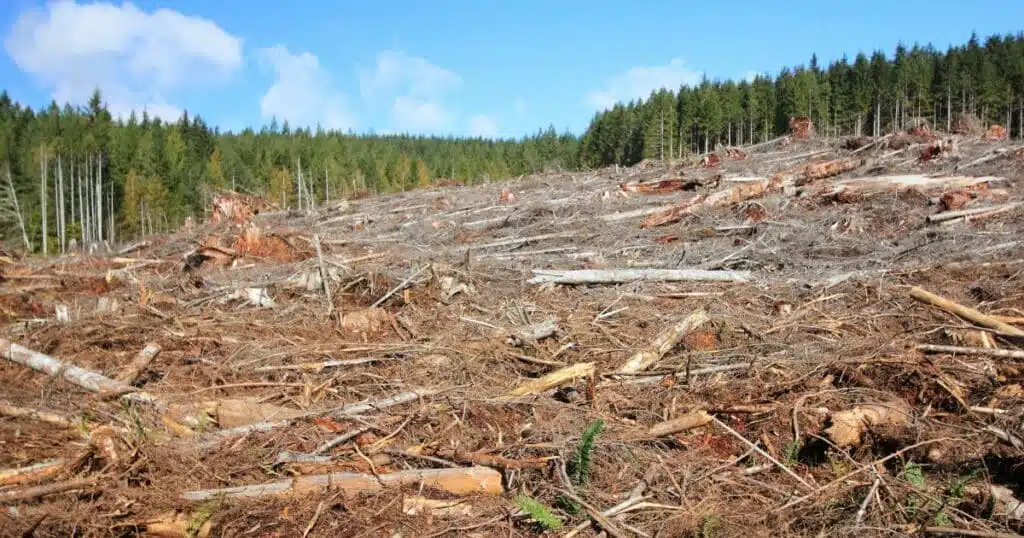Ondo State Governor, Mr. Lucky Aiyedatiwa, and some experts in forest management, have called on stakeholders to end deforestation for the sake of the country’s economy.
Aiyedatiwa, who spoke at the 9th Forests and Forest Products Society Biennial Conference, held on the campus of Elizade University, Ilara-Mokin, Ondo State, with the themed “Healthy and Resilient Forests for a Buoyant Nigerian Economy”, said there is the need for concerted efforts to stop deforestation in the country.
The governor, who acknowledged the economic importance of forests to the state, vowed that his administration would do everything possible to stop deforestation across the state.
Represented by the Permanent Secretary of the Ministry of Agriculture, Chief Segun Odusanya, the governor noted that the conference was important to the state, which is presently exploring all means to revive its forests that have been degraded by human activities.
“The European Union, EU deforestation-free programme has been an eye-opener to this state, and the state will spare no effort in complying with the EU regulations. We will do everything possible to stop deforestation,” Aiyedatiwa declared.
In his remarks, a Professor of Forest Information Systems at the University of Eastern Finland, Timo Tokola, urged stakeholders to keep Nigeria’s forests healthy through digital management and sound government policies, calling for a shift from extraction to sustainable management of forests, with continuous inventory, digital transparency, and private sector leadership under clear rules.
Tokola, in a keynote address, highlighted the economic roles of forests, which include medicinal plants, domestic timber, construction materials, furniture, panels, paper, bush meat, fibre, and ecosystem services, among others, affirming that Nigeria’s forests have exceptional ecological potential, if sustained through digital management, healthy practices, and improved government policies.

Tokola, however, identified some challenges facing the nation’s forests, including severe forest loss from agriculture, urbanisation, illegal logging, fuel wood, outdated management plans, lax enforcement at state level, infrastructure gaps, mill technology, and weak treatability, urging stakeholders to uphold sustainable and socio-economic goals and adopt natural forest policies that would help achieve realistic and improved forest gains.
In her speech, the Vice-Chancellor of the Federal University of Technology, Akure, Prof. Adenike Oladiji, maintained that forests play significant roles in human life, including the beautification of the environment and serving as a means of survival for forefathers, who depended on them for most of their needs, stressing the need for more collaborations among institutions to advance the Nigerian forest sector.
In his welcome address, the President of the Forests and Forest Products Society, Prof. Shadrack Akindele, described forests as not just clusters of trees, but the lungs of the planet, the guardians of biodiversity, and the anchors of rural economies.
The FFPS President, who is also the Vice-Chancellor of Redeemer’s University, said, “A healthy forest ecosystem supports water regulation, soil fertility, climate stability, and cultural identity. Nigeria’s forests are under enormous pressure from deforestation, illegal logging, wildfires, land-use conflicts, among others”.
Despite these setbacks, Akindele affirmed that “within these challenges lie opportunities for innovation, for reforestation, for green entrepreneurship, and for redefining our national development trajectory”.
Data from the Food and Agriculture Organisation (FAO) of United Nations show that forests currently cover about 23% of Nigeria’s land area, reflecting a steady decline over the years. According to Global Forest Watch, between 2000 and 2024, the country lost roughly 1.3 million hectares of tree cover. Deforestation in Nigeria is largely driven by illegal logging, farming, urbanisation, and fuelwood use.
The Federal Government, through initiatives like the AIM4Forests project, supported by FAO, is working to improve forest monitoring and promote sustainable management.
Ondo State, one of Nigeria’s major forest belts, has also suffered extensive degradation, prompting renewed efforts to enforce conservation laws and align with international deforestation-free standards.

